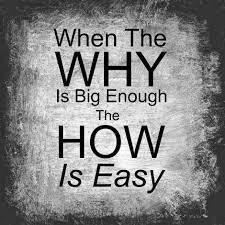
"Direction is more important than speed"
The highest level performers in all walks of life have one specific thing in common – they have a WHY! This is true for CEO’s of Fortune 1000 companies, U.S Military Special Forces Operators, professional and Olympic athletes, and even A-list celebrities.
What does it mean to have a WHY?
All of the people mentioned above are able to successfully compete at the absolute peak of their field because they have a clear and defined reason to do what they do. Developing a WHY is the best way to ensure you are making progress towards your goals and avoiding setbacks towards said goal.
Why simply means, you have a deep and profound understanding of WHY you get out of bed and do things throughout your day. The groups of people mentioned above can compete and have success at the absolute peak of their field because they have a clear and defined reason to do what they do. Their “WHY” gives them purpose, motivation, determination, discipline and reminds them constantly of their direction. For this reason, it is arguably the single most important mental skill an athlete, or anyone, can develop. Having a why allows you to develop a how and when (goals), resiliency, confidence, and a clear path to the rest of the mental skills techniques we will work through. Having a strong why is also a key component in developing another key skill, discipline. Think about this, its 4:30 or 5 am, you have a morning lift or run for your sport, the alarm goes off and you want nothing more than to hit snooze and roll over. Then, you remember your why, you want to be the best, you want to succeed in your sport, so you repeat it to yourself and you get up and go crush a workout. Discipline, simply put, is understanding why you are going to do something and then doing it even if it is unpleasant for a time. Growth comes outside of your comfort zone and the why is what pushes the boundaries. Developing a WHY is the best way to ensure you are making progress towards your goals and avoiding anything that will cause setbacks towards said goals. (More to come on goal setting later). A good why, however, can be tricky. If your why is weak then it will crumble at the first sign of pressure, pain, adversity, and even failure. When your why is weak you will negotiate with your inner self who undoubtedly will vote for the way of comfort: a warm bed, a video game, social media scrolling, etc. True negotiation and a strong inner why will prioritize and give each comfort and discomfort its due.
So how does one go about developing a solid WHY?
The first step you should take is to ask yourself what your ultimate dream in life truly is. Is it to be a professional athlete, a CEO, a millionaire? Is it to make your high school sports team, be a good spouse, graduate high school and college, start your own business, or have a family?
Whenever you figure out this dream future, the next and most important step is to ask yourself … WHY do I want to do/be this?
Now, there are some vital things to remember when developing your WHY.
By this point the word why has semantic satiation, you have said it so much it sounds weird, but its worth repeating. It is the foundation of this mental skills book. It is the starting point to all mental skills in athletics and in life. You should have an individual why and a team why, if you play a team sport, to remind you and your teammates and coaches why you do what you do when you do it.
For Athlete’s
For Coaches
You will see that once you have your WHY, everything else seems to be a little easier to figure out (goal setting, visualization, making choices). So develop your why and start conquering your life!
1. Register your company
2. Create a searchable listing
3. Connect with more clients
